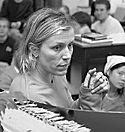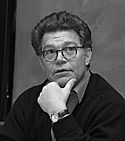
 |
||
The Yale Alumni Magazine is owned and operated by Yale Alumni Publications, Inc., a nonprofit corporation independent of Yale University. The content of the magazine and its website is the responsibility of the editors and does not necessarily reflect the views of Yale or its officers. |
Speaking as a potential candidate for mayor of New Haven, real estate developer Joel Schiavone '58 told an undergraduate group on November 15 that neither New Haven nor Yale has done enough to attract private investment in the city. Schaivone told the Yale Entrepreneurial Society that they are “the most important organization in New Haven” and that Yale must persuade its graduates to stay and start businesses. Schiavone’s candidacy will be cut short unless he successfully challenges the city’s length-of-residency requirement; he moved to New Haven from Hamden two years ago.
Academy Award–winning actress Frances McDormand '82MFA doesn’t mind being called on for quirky roles like the sheriff in the film Fargo. She told a master’s tea at Ezra Stiles College on November 2 that she gets a wider range of roles because she is considered “off- center.” Said McDormand: “I don’t mean that I try to be off-center. I just am, and I’ve come to terms with it.” McDormand also said she works in movies in part “to pay the bills” so she can afford to work in live theater.
On November 16, Oregon State University marine biologist Jane Lubchenco explored the challenges involved in making the transition to a sustainable world. Lubchenco, a member of the National Academy of Sciences, was speaking as part of the forestry school’s “Globalization and the Environment” Centennial Lecture Series. “We’ve become a major force of nature,” she said, describing what scientists know about our impact on the planet’s land, oceans, atmosphere, and climate. “The rates, scales, and kinds of changes we’re causing are vastly different than ever before, but there are also reasons for hope.”
In the days before the results of the presidential election were decided for good, political comedian Al Franken came to Yale on December 7 for an event sponsored by Pierson College and the Yale Record. Franken, a liberal Democrat, offered advice for Al Gore from his self-help-addled character Stuart Smalley, who said Gore should tell himself: “I’m good enough, I’m smart enough—and doggone it, 48 percent of the people like me.” Franken also demonstrated his ability to draw a freehand map of the United States from scratch on a nearby blackboard.
Author Catherine Bush '83 read from her two novels, Minus Time and Rules of Engagement, at a master’s tea in Ezra Stiles College on December 5. Bush, a native of Canada, said her novels have required a great deal of research into subjects ranging from space travel to international affairs. “I know you’re told in writing class to write about what you know,” she said, “but if I have any kind of dictum, it’s to write about what I want to know.”
Levi Jackson '50, a New Haven high school football star who became Yale’s first African American football captain, died on December 7, 2000, in Detroit after an extended illness. Jackson, who chose Yale over a contract with the New York Giants when he was discharged from the Army, had a notable career as a Ford Motor Company executive and civic leader in Detroit after he graduated from Yale. He also served on the Presidential Commission on White House Fellows and the Selective Service Appeals Board. Close-Up
On October 30 at Sudler Hall, pianist and School of Music professor Boris Berman described the “grit, ingenuity, and imagination” necessary to become a concert performer in the 21st century. Berman’s talk coincided with the publication by Yale University Press of Notes from the Pianist’s Bench, his advice on everything from the best fingering patterns to dealing with stage fright. “This is a very difficult job,” said the veteran musician, a “pianist’s pianist” whose playing has been praised for “its poetic refinement and intense musicality” and who is listed in the book The Most Wanted Piano Teachers in the U.S.A. “To give a performance that can touch the heart, we have to develop sensitivity and intuition, have an emotional empathy with the work we’re performing, and have the charisma to command the attention of our audience.” In his talk, Berman alternated between the lectern and the keyboard, offering insights culled from a career that began when he was a student in his native Russia, a country he left for Israel in 1973. He came to Yale in 1984 and currently heads the piano department at the School of Music. In addition, Berman continues to perform around the world, and he maintains an active recording schedule. To get to the heart of a musical work, the performer has to be part detective, part actor, and consummate technician. “Practice efficiently, but no more than is necessary to fix whatever needs to be fixed. There are more fascinating things in life than practicing piano.” he admonished. And never think that technique, however well honed, is enough. “A performer who has just fingers, but neither soul nor brain, cannot move an audience.” |
|
|
|
|
|
|
|
|
©1992–2012, Yale Alumni Publications, Inc. All rights reserved. Yale Alumni Magazine, P.O. Box 1905, New Haven, CT 06509-1905, USA. yam@yale.edu |
||






